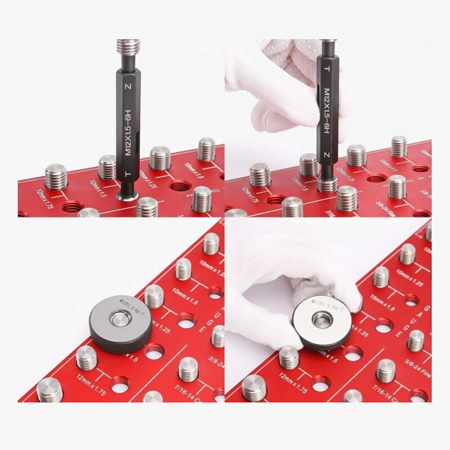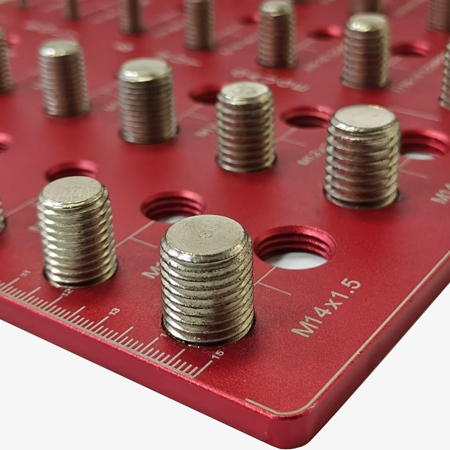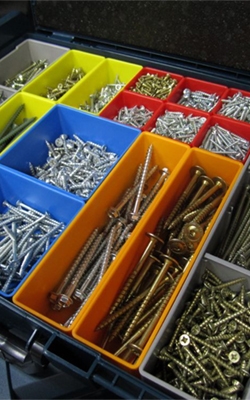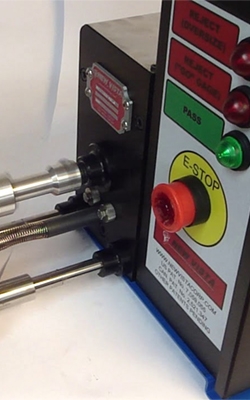SISCO precision 28/34/44 nut and bolt thread checker is constructed from 6061 aluminum alloy for lightweight strength, while its pillars are crafted from durable SUS304 stainless steel. It features a hard anodized surface and rust-resistant threaded pins that are securely embedded in the gauge holes, ensuring precise and long-lasting performance.

Practical Features for Efficient Thread Identification
- Quickly Identify Bolts and Nuts: A professional thread checker helps you quickly determine the sizes of nuts and bolts, featuring 28, 34, or 44 common thread sizes to solve common maintenance and processing issues.
- Convenient and Essential Tool for Accurate Measurements: The screw gauge includes inch and centimeter scales for accurate length measurements of bolts, screws, nuts, and washers, saving time and increasing work efficiency.

Thoughtful Design and Durable Materials for Long-Term Use
- Pre-Drilled Mounting Holes for Flexible Storage Options: The nut and bolt thread checker includes three pre-drilled holes for easy wall hanging or toolbox attachment, offering flexible storage options.
- High-Quality Construction for Durability and Corrosion Resistance: Made from anodized 6061 aluminum to prevent corrosion, with bolts crafted from high-quality steel for precision, durability, and resistance to wear.
Applications
An nut and bolt thread checker is a versatile tool designed to measure and identify the thread sizes of nuts, bolts, and screws, covering both diameter and thread pitch. Ideal for professionals and DIY enthusiasts, it ensures compatibility by accurately determining the correct thread specifications, reducing the chance of mismatched fasteners. This tool supports tasks such as verifying thread sizes, organizing mixed fasteners for quick identification, facilitating accurate machining and repairs by matching existing specifications, and maintaining quality control in manufacturing by checking fastener tolerances. Thread checkers are typically structured as gauge boards or compact tools featuring pre-threaded holes and studs for easy, precise size-matching.

Organizing Fasteners

Machining and Repairs

Quality Control

Thread Verification
| Model | SISCO-TG-28 |
| Accuracy | Class 2 / 3A / H28 |
| Check Size | Identify 28 / 34 / 44 distinct sizes of nuts and bolts |
| Material | 6061 Aluminum alloy |
| Thread Type | Nut and bolt thread gauge |
| Color | Red |
| Weight | 1.2kg |
Q1: What types of thread checkers are available?
A1: There are several types of thread checkers available, each designed for different applications. The most common types include thread pitch gauges, which have a series of teeth or notches to measure the pitch of a thread; thread size gauges, which measure the overall diameter of a bolt or nut and determine its compatibility with other fasteners; and combined pitch and size gauges, which allow for both measurements in one tool. Universal thread checkers are versatile and can check a wide range of thread sizes and pitches, often used for both nuts and bolts. Some checkers are designed specifically for metric threads or imperial threads, while others are equipped to handle both. There are also specialized checkers for specific thread forms, such as acme threads or trapezoidal threads, which require unique gauges for accurate measurement.
Q2: How to know what size thread to use?
A2: To determine the correct thread size to use, you first need to identify key parameters of the threaded component: thread diameter, thread pitch (distance between threads), and thread type (metric, imperial, or another standard). Using a thread gauge is a simple way to measure these features, as it can help match the pitch and determine if the thread is coarse or fine. Additionally, consulting technical documentation, such as engineering drawings, standards tables, or specifications, can provide guidance on the appropriate thread size for a particular application. Consider factors like load-bearing capacity, material strength, and compatibility with mating parts to ensure the chosen thread size meets functional and safety requirements.
Q3: What does "6G" mean in threading?
A3: In threading, "6G" is a tolerance class for metric threads specified by ISO standards, indicating a medium-fit tolerance between mating internal and external threads. It defines the allowable limits of deviation for the thread's size, with "6" representing a standard tolerance grade and "G" denoting the position of the tolerance zone relative to the basic profile, typically offering more clearance than tighter fits such as 6H or 5G. This fit is commonly used for general-purpose applications, balancing ease of assembly with a secure and functional engagement.
Tips: How does a nut and bolt thread checker work?
A nut and bolt thread checker works by using a series of gauges or templates to assess the size, pitch, and condition of a bolt or nut's threads. The checker typically includes a set of notched or toothed gauges that correspond to different thread sizes and pitches. To use it, the fastener is matched against the appropriate gauge, which helps verify if the threads align correctly and are in good condition. If the threads of the fastener do not fit snugly into the checker, it indicates that the threads may be worn, damaged, or incorrectly sized. This ensures that bolts and nuts fit properly together, preventing issues like misalignment or insecure fastening.
Thank you for buying industrial test and measurement equipment on SISCO.com, all products sold by SISCO and the partner cover a 12 months warranty, effective from the date of receiving the products.
What is covered?
SISCO is responsible for providing free spare parts, and free technical support to assist the customer to repair the defective products until the problem is solved.
What is not covered?
- Product purchased from anyone other than a SISCO store or a SISCO authorized reseller.
- Expendable parts.
- Routine cleaning or normal cosmetic and mechanical wear.
- Damage from misuse, abuse or neglect.
- Damage from use of parts other than SISCO approved.
- Damage from use outside the product’s usage or storage parameters.
- Damage from use of parts not sold by SISCO.
- Damage from modification or incorporation into other products.
- Damage from repair or replacement of warranted parts by a service provider other than a SISCO authorized service provider.
- Damage caused by the application environment not meeting the product usage requirements and the failure to perform preventive maintenance.

